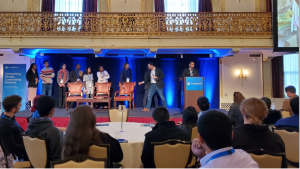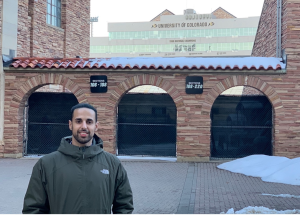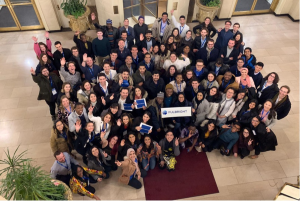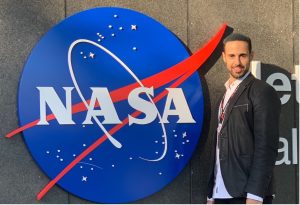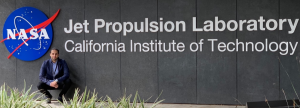Rayan Mazouz
Received a Fulbright – Netherland-America Foundation grant in 2019
“In America, everything is portrayed in a grand manner. In the Netherlands, we have a more down-to-earth attitude, but I can appreciate that marketing of the American Dream. America has a large-scale entrepreneurial culture and that brings a lot of challenge, inspiration and motivation. It once inspired me to go into space travel and I find that many new ideas and technologies still come from the US.”
Rayan Mazouz studied Aerospace Engineering at TU Delft and then received a Fulbright-Netherland America Foundation Scholarship for his research at the Jet Propulsion Laboratory (JPL) in Pasadena, a suburb of Los Angeles. He worked on several projects at this complex of the National Aeronautics and Space Administration – better known as NASA – which is run by the California Institute of Technology. Rayan is currently pursuing a PhD programme at the University of Colorado Boulder, a strategic partner of NASA. From his new home, he talks about his research and how he experienced 2020, which was an eventful year in many ways, as a Fulbrighter in the US.
Dream
It was his dream from a young age to work for NASA later on, Rayan explains enthusiastically. “I was always fascinated by the work they did. Even as a child, I had a deep desire to explore the mysteries of the universe and that is also the reason I later started studying Aerospace Engineering in Delft.” His thesis research on precision landing on Mars prompted his first contacts with the US space agency. “My thesis research focused on a NASA mission – which, by the way, landed on Mars last February. Based on that research, I gradually started conversing with researchers in the US.” Those contacts eventually led to a research position at JPL, a competitive place for a young researcher. “You have to meet a number of requirements to work for NASA and of course you try very hard to do that,” Rayan continues. “They are the leaders in space exploration. Fortunately, the Master of Science Aerospace programme at TU Delft is very well regarded worldwide and that also definitely helped in getting this spot.”
During his master’s studies in Delft, Rayan also came across the Fulbright programme. “I had read here and there about the Fulbright programme, which aims to strengthen ties between the US and, in this case, the Netherlands. I thought it was an excellent idea to bring together the programme in Delft and a space programme in the US and applied.” After his initial research period at NASA, he eventually received a Fulbright scholarship to continue his research.
Research
In 2019, Rayan joined JPL’s Robotics Department. Since then, he has worked on two projects. “During the first project, I continued working on precision landing. Here you can think about landings on Mars, but also on other planets,” Rayan explains. It is an important topic. “From a scientific point of view, you want to get to the most interesting places on a planet, but these are usually also the most complex places to land. There are craters and other factors that can pose a danger to the mission. Such a mission can easily cost billions of dollars, so you want to avoid things going wrong during the landing.” During his research, Rayan developed algorithms to analyse the landing to improve accuracy.
The second project he worked on, and is still contributing to today, involves satellites. “Multiple satellites you can fly in formation to work together as one big virtual satellite,” he says. The applications of those virtual satellites are endless. For instance, the project Rayan is working on is aimed at better mapping Earth’s climate problem. “Data can be collected on sea level rise, ice thickness or other data related to Earth observation,” he explains. Formation flying is not an easy job. “The satellites are at a very short distance from each other and, of course, you want to avoid them colliding. That requires very precise calculations.” Rayan has published several papers on these topics.
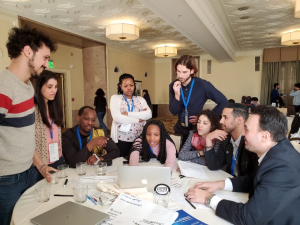
Cultural exchange
Now living in the US for two years, Rayan has had an interesting but also eventful year. Of course, when he arrived in Los Angeles in 2019, he did not know that a few months later a global pandemic would occur. “I am lucky to have participated in many events before the pandemic started. I started my Fulbright research in late 2019 and in March 2020, the world went on lockdown.” His research could continue online, but travelling suddenly became a lot more complicated after March. One of the best programmes he was able to attend alongside his research was a Fulbright seminar in Pittsburgh, Pennsylvania – shortly before the US went into lockdown. “The State Department had organised a Lab to Market Enrichment Seminar that brought together Fulbright fellows from all over the country. I met so many unique and talented fellow Fulbrighters there,” Rayan enthuses. “The programme only lasted a few days, but it was enough to create a close-knit network that I still have a lot of contact with.”
“The underlying idea of the seminar was to create a business pitch that allows you to efficiently take a design from the lab – and it could be anything – to the market. There were also guest lectures organised by Carnegie Mellon University and activities in the city of Pittsburgh, one of the old steel industry cities in the Mid-Atlantic.” Rayan worked with a team of other Fulbrighters on a business plan and eventually won the competition. “We were tasked with developing an existing technology theoretically and applying it for use in a Third World country. In doing so, we had to think about questions like financing, what stakeholders there are and who can benefit from the technology,” Rayan says. His team worked on a plan to apply biogas systems for agriculture and power generation. “That idea came from my minor in International Entrepreneurship and Development in Tanzania. The idea was to use artificial intelligence software to make the systems more efficient. Farmers could then produce more food to bring famine to a slightly lower level.”
The seminar is one of his fondest memories of 2020. “Winning that competition was fun, of course, but the exchange of cultures that ensued there, with people from all over the world, was the best result. Everyone came together there to learn new things and learn about each other’s cultures. It was one of the last events I could attend before the world locked up, and I am still in touch with those people. They will also, now that it is possible again, come to see me again in Colorado.”
Eventful year
With the outbreak of the corona pandemic and various protests, the year 2020 was historic in many ways. Rayan witnessed all the developments from the US and can clearly remember the moment when the US went into lockdown. “I was on my way to New York from Los Angeles for an event with the Netherland America Foundation (NAF) – the annual Connection Dinner. When the plane was flying somewhere in the middle of America, I decided to read my e-mail – you can do that these days with the wifi on board – and read that the event had been cancelled,” Rayan laughs. “That was a weird time.” Once in New York, he did manage to have lunch with the NAF staff, but the city went into lockdown shortly afterwards and Los Angeles was also completely different on his return. “Pasadena is normally a very lively place. There is always something to do. Now I was walking down the street and the whole city was on lockdown. It was strange to see that, like in the Netherlands, all the shelves in the supermarkets were completely empty. Surely that was a unique thing to experience.”
Things are much better in the US now, Rayan believes, but it was also a year full of tension. “We were not only dealing with the pandemic, but also with the death of George Floyd and the subsequent protests, the elections and the storming of the Capitol. I noticed that tension was running high among the people. The protests in LA became very extreme at one point and there was a curfew – which is not really common in the US either,” he says. “I think people here had really had enough at one point. Americans are very fond of their freedom and when that is curtailed for them it explodes. But in the end, it was a heady year for everyone and not just the US.”
Los Angeles
Fortunately, not everything was at a standstill during the past year. His research did not suffer from the lockdown and many meetings were able to take place on a virtual basis.
“That, of course, is the advantage of today’s technology. Before the pandemic, I attended many Fulbright events in LA – I went to basketball games, volunteered at a homeless shelter and attended events through the NAF, such as the opening of a business centre in LA with a delegation from the Dutch government and the Consulate in San Francisco.” During corona, many virtual events were organised and this also has many advantages, Rayan finds. “I attended virtual sessions in other states, including an event on water management from a Dutch business centre in Texas. I followed it purely out of interest, but I really liked that this opportunity was there. Before, it was impossible to go to so many events in other states. Now that we have discovered these opportunities, I think it will continue to be possible in the future to follow an event virtually if you cannot physically attend.”
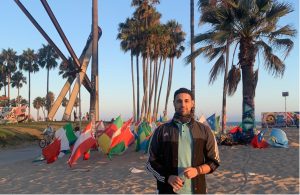
PhD
Rayan recently started a PhD programme in Aerospace Engineering at the University of Colorado at Boulder, a strategic partner of NASA that receives a lot of funding for research in aerospace engineering. It’s a great place to continue his research, thinks Rayan. “I had great years at TU Delft and learned a huge amount, but sometimes it is important to be in a different environment and learn new things again.” His education in Colorado also dovetails well with his studies in Delft. “TU Delft and University of Colorado Boulder both have an international character and focus on practising what you learn.”
Research opportunities may be similar, but in terms of funding, more is possible in the US, he thinks. “The biggest difference in doing research, at least in the space field, is that the US has numerous research labs in which they invest a lot of money. Europe also invests in space technology, but to a lesser extent than the US. In addition, universities in the US actually collaborate on space missions. Just last year, the university in Boulder launched a mission in cooperation with the Arab Emirates, and that mission has now also arrived safely.”
His current research, which is sponsored by the National Science Foundation, is more focused on the fundamental mathematics behind spaceflight and is therefore more broadly applicable. “I still focus on autonomy in spaceflight, but am now more broadly concerned with robotics and the fundamental mathematics behind it. As a result, I am also learning new things. Moreover, the applications of this research are endless. Ultimately, my research is intended to be applied in space travel, but you can also use it for the medical world, for example, or to make self-driving cars.” Rayan, meanwhile, also continues to work on his research with NASA.
As the pandemic winds down in intensity, Rayan is also very much looking forward to connecting with his teammates and discovering his new place to live, Colorado. “Discovering a new place is difficult in a pandemic, but developments look positive,” he says. “Many activities were still virtual in the past few months, but the advantage of Colorado is that there are many natural areas and you can always go outside. Colorado really has a hike culture – even more so than in California. I am often playing sports in the mountains and also play football a lot. Next season I can hopefully pick up winter sports again too, because the natural areas in Colorado are unprecedented.”
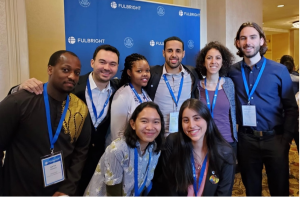
Mutual understanding
In 2021, the Fulbright programme will celebrate 75 years of cultural exchange. The purpose of the Fulbright programme is still very relevant, agrees Rayan. “The world has changed so much that the Fulbright programme and its objective are more crucial and essential than ever,” he says. One of the mottoes of Fulbright that I often see recurring is ‘Connecting People, Connecting Nations.’ I believe this is one of the strongest values of the Fulbright programme. Everyone who is part of the programme has their own background and their own area of expertise, but the common goal is that connection between people and nations. Given where we are now globally, I think that is hugely important.”
Fortunately, relations between the Netherlands and the US have not diminished over the past 75 years. There is a lot of interest in the Netherlands in the US, notes Rayan. “The Netherlands and America are good friends and I’ve noticed that too. If you speak to Americans they are quick to ask questions about Dutch culture. They often ask about Amsterdam, which is the city they know best and also like to visit. In that respect, I regularly have conversations about Dutch and American culture.”
Has his own image of the United States changed yet, now that he has lived there for two years? “Yes and no,” Rayan concludes. “When I was growing up, I was already very interested in American culture and then you already have some idea of how things are here. I do think the world in itself has changed in recent years – not just the US – and in that respect, the image you have of a country naturally changes too. At its core, I believe the American Dream is still there, especially in space, despite all the events of recent years. America is and remains an entrepreneurial culture. It is only beautiful that we are now celebrating 75 years of good relations and I hope there are many more great years ahead.”
He wishes good luck to future Fulbrighters in the US. “You should be very proud of the prestigious fellowship you have received. The Fulbright programme offers so many opportunities. Get to know as many people as possible, take advantage of all the labs and research opportunities, build a network and contribute to the continuity of the Fulbright family.”
